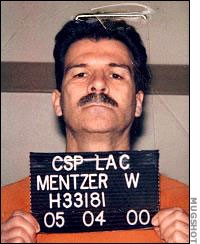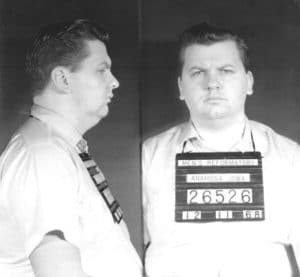The world has been captivated by serial killers for a very long time, digging into their childhoods, family histories, psychological profiles, brain scans, and much more.
According to many studies, most serial killers have troubled brains and commit their crimes because of different reasons. Furthermore, most serial killers have experienced childhood trauma.
In this article, I will discuss serial killers, in general. However, I will also dissect the 4 types of serial killers along with their subcategories, so let’s dive right into it.
What’s A Serial Killer?
A serial killer is someone who murders 3 or more people. Usually, serial killers take a break of about 1 month or so between their murders.
The common motive for serial killings is psychological gratification and most serial killings include sexual contact with the victim. However, the FBI says that the motives of serial killers can include thrill-seeking, anger, attention-seeking, and financial gain.
The killings can be attempted or done in a similar way. The victims can have something in common such as look, race, age, gender, or something else that only the serial killer can recognize. The FBI will usually focus on a specific pattern serial killers follow.
Based on this pattern, they will gather crucial clues that will help them solve the crime and catch the serial killer on the loose. Now, let’s learn more about the main types of serial killers.
4 Types Of Serial Killers
The types of serial killers have been based on their motivations for carrying out their murders. However, the 4 main types of serial killers include visionary, mission-oriented, hedonistic, and murders motivated by power or control.
I also like to mention that these motivations can overlap. Meaning, serial killers can fall into more than one type because they’re complex creatures just like any other person. Below, I will discuss the 4 main types of serial killers along with their subcategories.
In short, visionary serial killers believe that someone or something is commanding them to kill and they most likely suffer from psychosis. Mission-oriented killers, on the other hand, kill to “clean” society from a certain group of people. Thus, they have an agenda.
Hedonistic serial killers act for their pleasure such as torture, rape, or money. They can be broken down into 3 subcategories: thrill, lust, and comfort. Lastly, power/control killers fantasize about having power and control over their victims.
Visionary serial killers

Visionary killers kill because they strongly believe that someone or something is requiring them to do so. And more often than not, these serial killers are suffering from psychosis. This psychosis alters the perception of reality in these serial killers.
Meaning, they’re usually unable to tell the difference between what’s real and what’s only in their head. They can suffer from different hallucinations and hear voices that aren’t real.
Moreover, they can hold delusional beliefs. For instance, a visionary serial killer might believe that other people are out to get them. Or that they can read their mind. However, what I find most scary about these serial killers is their randomness.
Visionary killers won’t specifically target their victims. So, they won’t pick specific types of victims or stalk them. And because of this, their murders will seem “random”. This can make it much harder for law enforcement to connect their crimes together and catch a visionary serial killer.
On the bright side, they are disorganized serial killers. Meaning, they will put little or no effort into covering up their crimes. Nor will they put too much planning into the crime. This can help law enforcement track the serial killer faster and prevent future murders.
Mission-oriented serial killers

Mission-oriented serial killers kill to “clean” society of a certain group of people.
For instance, they might be racist against a specific religion or ethnicity. Or they might specifically target sex workers, homosexuals, or transgender people. These serial killers usually think that they’re doing the right thing. They believe that they’re doing the world a favor by murdering their targets.
Meaning, they have a specific purpose in their heads, so they won’t stop until they’ve been murdered or caught by law enforcement. What’s important to know about these people is that they’re not psychotic. Thus, unlike visionary serial killers, mission-oriented ones aren’t out of touch with reality.
They don’t suffer from delusions or hallucinations. And God or some other entity isn’t requiring them to kill other people, so their decision to kill was a decision that they made all by themselves.
Typically, mission-oriented serial killers are organized. They plan their murders and can lead a perfectly normal life. Additionally, they tend to murder their victims rather quickly. For instance, they might use a gun because it’s quick and effective. They also don’t get enjoyment out of their murders.
As a result, the crime scenes will show no signs of torture or sadism. Usually, these killers place distance between themselves and their victims.
They can be obsessive and calculated, so feelings of vengeance or hatred are often driven factors behind their serial killings. They feel like they’re getting back at a part of society. Also, in most cases, these serial killers tend to stick to their geographical area.
Hedonistic serial killers
Hedonistic serial killers kill for their pleasure and can be driven by different factors like sex, money, or thrill. This is why hedonistic serial killers can be split into 3 subcategories: lust, thrill, and comfort. So, let’s take a closer look at each subcategory of a hedonistic serial killer.
Lust serial killers

Lust killers rape, torture, mutilate and kill for their own sexual gratification. In simpler words, they gain intense feelings of pleasure by doing unspeakable things to their victims.
What’s interesting about lust killers is that they can fantasize about doing all of those things for years before they gather the courage to commit their first murder. Usually, these violent fantasies will control their thoughts to the point that they become a deep-seated psychological need.
And once these people commit their first crimes, they take over their life. Over time, they might require more stimulation to relive the “highs” of their first murders. As a result, the period between each killing can continue to become shorter and shorter as they struggle to control their needs.
Lust killers prefer weapons that place them in close contact with their victims. For instance, they can strangle the victim with their bare hands or use a knife. Moreover, lust serial killers will take various things from their victims to remind themselves of their murders.
They also revisit the crime scenes to relieve the murders. Some even mutilate the bodies of their victims and engage in necrophilia. However, it’s important to mention that these murders don’t have to include sexual intercourse. Meaning, these killers might not rape their victims.
The reason for this is that it’s the murder that provides them sexual gratification. They may “get off” on torturing their victims and mutilating their bodies. As a result, sexual intercourse with the victims can be unnecessary from their perspective.
Thrill serial killers

Thrill killers receive a thrill out of murdering people. For instance, seeing the terror in their victims’ eyes or hunting their victims can give them pleasure and an adrenaline rush. In other words, the suffering of other people excites them. Have you heard of people who killed others so they know what it feels like? Usually, that’s how thrill serial killers start their “career”.
They can appear completely normal and confident on the outside. However, they usually have feelings of powerlessness and inadequacy. And by committing crimes, they can make themselves feel strong and powerful again, especially if they don’t get caught.
Also, because thrill killers obtain pleasure out of seeing other people suffer, sadism can become a recurring theme of their crimes. For instance, they can mentally and physically torture their victims. They might encourage their victims to run so that they can chase after them, go to great lengths to scare them, or verbally taunt them.
In summary, a thrill killer feeds off the response that they receive from their victims. Lastly, rape can be used as a “tool” to inflict pain on victims or degrade them. However, it’s not the primary motivator in thrill serial killings.
For instance, a thrill killer can get excited enough just by shooting or killing their victims with their bare hands. And once they have killed their victims, they will lose interest in them because the goal has been achieved and the victim can no longer provide a response.
Usually, there aren’t any signs of mutilation after the killings of a thrill killer. As you can notice, every serial killer is very different and kills for different reasons. This is why not every serial killer falls into one category of serial killers. The motivations usually overlap. What’s your opinion? Drop a comment below and let’s keep the conversation going!
Comfort serial killers

Comfort killers murder for money or other material gains. For instance, they might murder their partner or family member to get an inheritance or insurance payout.
These serial killers often use poison. Close contact with their victims isn’t a necessity and they don’t like mutilation or torture. The murder is just a task to comfort serial killers and once they do the “task”, they get their prize. Furthermore, comfort serial killers are usually female.
If a female turns into a serial killer, then it’s likely that their key motivation for killing is wealth or money. This is why criminal profilers will predict lust, thrill, and control or power serial killers are male. Female serial killers are less likely to commit crimes for power or sexual gratification.
However, it’s important to remember that not every comfort serial killer is a woman. In fact, males still dominate this category of serial killers. Lastly, comfort serial killers can take a long break between their murders because murdering isn’t something they crave or enjoy much.
On the contrary, it’s just a “tool” that helps them accomplish their goals. Do you have a female serial killer that fits this category in mind? If so, drop their story in the comments.
Power/control serial killers

As the name of this category of serial killer suggests, they’re people who seek to obtain power or control over their victims. This is the last but also the most common type of serial killer in the world.
The power/control serial killers like to dominate their victims and usually, these serial killers (often men) have feelings of powerlessness and inadequacy. They’re also scared of rejection by the opposite gender. Further, power/control serial killers were abused as kids, so they’ve experienced childhood trauma.
Dominating others and taking away their lives provides a feeling of empowerment and control to these serial killers. They’re usually calculated, calm, very organized, and patient. They can also sexually assault their victims. However, they don’t do this for sexual pleasure but as a tool to exert control over them.
In other words, the act of dominating their victims and taking away their choice is what makes them feel high. And even after the murder is completed, these serial killers can continue to “control” their victims. For instance, they might return to the bodies and mutilate them further and engage in necrophilia.
Another common thing about these serial killers is that they usually keep souvenirs that remind them of their murders. For instance, organized serial killers tend to take photographs of their victims. Or keep their jewelry or pieces of clothing. This allows them to relieve the murder and fantasize about them.
The souvenirs also represent tokens, badges, or trophies. In simpler words, they symbolize the lives that they took. They might even gift pieces of jewelry from their victims to their partners and claim that they found or purchased them. That way, they can be constantly reminded of what they “accomplished”.
Additional Types of Serial Killers
Aside from the 4 common serial killer types, I also want to mention 2 other types that were common enough to make the Wikipedia page on serial killers, so let’s take a look.
Media influences

Many serial killers state that a violent culture influenced them to kill people. For instance, the serial killer, Ted Bundy has revealed that hardcore pornography was mainly responsible for his killings. Other serial killers idolize people for their perceived vigilante justice or deeds. For example, Peter Kürten admired the serial killer, Jack the Ripper while the infamous serial killers, Ed Kemper and John Wayne Gacy idolized John Wayne.
Serial killers who have a passion for popularity or to be known for their actions want media attention as a way of validating as well as spreading their murders. Fear also takes part in these serial killings because some serial killers enjoy causing fear and look for attention from the media during their killing spree.
Military serial killers

Soldiers keep countries safe and risk their lives but they also risk their mental health. Murdering people no matter the circumstances can’t be good for your mental health. Take Charles Ng, a dishonorably discharged Marine for example. He is one of the most infamous serial killers who kidnapped, raped and killed many people.
However, it’s important to mention that he was also abused as a child by his father, so he didn’t have a good childhood. He was also caught stealing automatic weapons and pleaded guilty in 1984. Charles Ng was a problematic person in general and doesn’t represent every soldier in the world. I also want to state that I don’t believe every soldier has become or will become a serial killer. However, many serial killers have served in the military. Or related fields. Moreover, about 7% of serial killers had military experience.
Last but not least, you can use 2 theories to examine the connection between military training and serial killing if you’re interested in doing so. The applied learning theory claims that serial killing can be learned. The military is training for higher kill rates from servicemen while training the soldiers to be desensitized to taking a person’s life. The social learning theory can be utilized when soldiers get accommodated and praised for killing. They either learn or think that they learn, that it’s totally acceptable to murder because they were praised for it in the military.
What do you think? Does the military produce serial killers?
Final Thoughts
Serial killer types can overlap, especially hedonistic and power/control types.
Power/control serial killers can also have specific traits of thrill killers. For instance, they might commit horrible murders to dominate their victims and apply control over them. That is their main motivation for doing such horrible things. However, they might also taunt the victims’ families or the authorities, which is something you would expect from most thrill serial killers.
Overall, you can’t fit all serial killers into specific categories because they’re just as complex, if not more, than other human beings. Meaning, it’s hard to fully understand why they do what they do. What’s your opinion on the different types of serial killers? Have you ever met a serial killer? If you have some interesting facts about serial killers, drop a comment, and let’s keep the conversation going down below!
There have been many movies, documentaries, and tv series on serial killers. While it is true that a majority of serial killers are men, there are plenty of equally disturbing examples of female serial killers and child serial killers.


